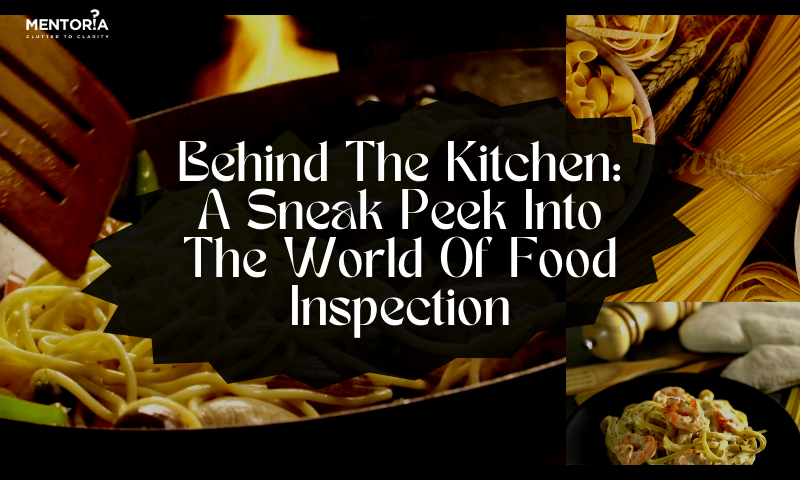Behind The Kitchen: A Sneak Peek Into The World Of Food Inspection

Do you have a nose for justice and a stomach of steel? If so, the world of food inspection might just be your culinary calling! Picture this: a thrilling adventure where you get to sleuth out food safety violations, decode cryptic labels, and embark on epic quests to protect public health—one restaurant at a time. Becoming a food inspector isn’t just about the thrill of wielding a thermometer; it demands a blend of essential skills and knowledge that’s as rare as a perfectly cooked steak. Let’s dive in!
8 Essential Things You Need To Know
Deep Understanding Of Food Safety Regulations
As a Food Inspector, a comprehensive knowledge of food safety regulations is your foundation. Familiarise yourself with local, national, and international food safety laws and standards, such as the FDA’s Food Safety Modernization Act (FSMA) and the Codex Alimentarius. Stay up-to-date with the latest revisions and amendments to ensure your inspections are in line with current requirements.
According to the World Health Organization (WHO), unsafe food causes an estimated 600 million cases of foodborne illnesses and 420,000 deaths globally each year.
Having a profound understanding of food safety regulations enables you to uphold the highest standards in food inspection. Regulations are in place to safeguard public health by preventing foodborne illnesses and contamination incidents. As a Food Inspector, you become the frontline defender, ensuring that food establishments adhere to these regulations and that consumers have access to safe and wholesome food.
Foodborne Pathogens And Microbiology
Understanding foodborne pathogens and microbiology is vital for a Food Inspector. Familiarise yourself with the common culprits, such as Salmonella, E. coli, and Listeria, and their sources of contamination. Learn about safe food handling practices and the principles of Hazard Analysis and Critical Control Points (HACCP) to prevent and control foodborne illnesses.
The Centers for Disease Control and Prevention (CDC) estimates that 48 million Americans suffer from foodborne illnesses annually, resulting in 128,000 hospitalizations and 3,000 deaths.
A solid grasp of foodborne pathogens and microbiology empowers you to identify potential risks and implement effective control measures during food inspections. Being able to recognize signs of contamination and understanding the factors that contribute to foodborne illnesses allows you to assess the safety of food establishments accurately. By employing your expertise, you play a crucial role in preventing foodborne outbreaks and protecting public health.
Inspection Techniques And Sampling
Mastering inspection techniques and sampling methods is essential for conducting effective food inspections. Learn how to properly collect samples for testing and evaluate food production processes to ensure compliance with safety standards. Familiarise yourself with risk-based inspection approaches to prioritise high-risk establishments.
Employing effective inspection techniques and sampling procedures allows you to obtain accurate and representative samples for analysis. By understanding the nuances of sampling, you can confidently identify potential hazards and make informed decisions regarding the safety of food products. Your proficiency in inspection techniques ensures that your inspections are thorough, reliable, and in alignment with regulatory requirements.
Strong Communication And Interpersonal Skills
As a Food Inspector, effective communication is key. Develop strong interpersonal skills to interact with food industry professionals, consumers, and colleagues. Be able to convey inspection findings clearly and professionally, and provide actionable recommendations for improvement.
According to a survey by the Food Safety and Inspection Service (FSIS), 84% of food industry professionals value clear communication from Food Inspectors during inspections.
Effective communication skills are the bridge that connects you to the food industry and the public you serve. Being able to articulate inspection results, explain regulatory requirements, and offer practical suggestions for improvement builds trust and cooperation among stakeholders.
Attention To Detail And Analytical Thinking
Food inspection requires a keen eye for detail and analytical thinking. Train yourself to spot potential hazards, identify deviations from food safety standards, and assess risks accurately. The ability to think critically and make informed decisions is crucial for ensuring the safety of the food supply chain.
The Food and Agriculture Organization (FAO) estimates that approximately one-third of food produced globally for human consumption is lost or wasted each year, posing significant challenges to food safety and sustainability.
Attention to detail is your superpower as a Food Inspector. By paying close attention to every aspect of food production, distribution, and handling, you can detect subtle signs of non-compliance or contamination.
Knowledge Of Food Processing And Packaging
A solid understanding of food processing and packaging is essential for a Food Inspector. Familiarise yourself with various food processing methods and packaging materials to assess their impact on food safety. Identify potential sources of contamination during production, storage, and transportation.
With comprehensive knowledge of food processing and packaging, you can evaluate the safety and integrity of food products from farm to fork. Understanding how various processing techniques can affect food safety empowers you to ask relevant questions during inspections and anticipate potential hazards. Your expertise helps ensure that food products are handled, processed, and packaged in a manner that preserves their quality and safety.
Continuous Learning And Professional Development
Food safety regulations and industry practices evolve rapidly. Stay ahead of the curve by engaging in continuous learning and professional development. Attend workshops, seminars, and conferences related to food safety and inspection. Obtain certifications, such as the Certified Professional Food Safety (CP-FS) credential, to demonstrate your expertise.
The International Association for Food Protection (IAFP) offers over 100 hours of professional development content annually for Food Inspectors and other food safety professionals.
Ethical Conduct And Integrity
Maintaining ethical conduct and integrity is paramount for a Food Inspector. Act impartially, without bias or favouritism, and uphold the highest standards of professional ethics. Your credibility as an inspector depends on your commitment to integrity.
Integrity is the cornerstone of your professional reputation as a Food Inspector. Your unbiased and ethical approach to inspections builds confidence in the food industry and the public. By upholding the highest standards of conduct, you inspire trust and respect, essential qualities for a successful Food Inspector. Your commitment to integrity ensures that the food supply chain is subject to fair and rigorous evaluation, making a positive impact on public health and safety.
How Mentoria Can Help
Becoming a food inspector is an exciting and rewarding career choice, but it requires a diverse set of skills and knowledge to excel in this field. By mastering these eight essential areas, you’ll be well-prepared to embark on your journey as a food inspector and make a significant impact on public health and safety.
At Mentoria, we’re dedicated to helping aspiring professionals like you achieve your career goals. Our team of expert mentors can guide you through the process of becoming a food inspector, providing personalised coaching and support every step of the way.
From exploring educational pathways and certifications to honing your skills in food safety and regulatory compliance, Mentoria is here to equip you with the knowledge and expertise needed for a successful career in this field.
With our tailored guidance, you’ll gain the confidence to excel in interviews, stand out among applicants, and ultimately secure your dream job as a food inspector. Let Mentoria be your partner in unlocking your potential and making a positive impact on food safety in your community.









